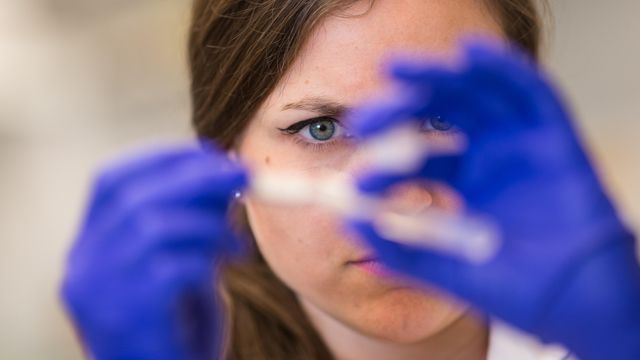ECU: a leader in STEM education
In a state known for innovation and technology, ECU stands out. From strategic collaborations with partner universities to programs aimed at encouraging both younger students and students from underrepresented populations to focus on STEM, East Carolina University is helping prepare the future workforce for careers in life science and technology.
Posted — UpdatedNorth Carolina, like many states, is experiencing an explosive demand for STEM-educated employees. East Carolina University is leading the drive to meet that demand through its unique STEM offerings and research capabilities.
New technology hubs are popping up across the country as tech jobs proliferate. Some might be surprised that Greenville was ranked the 73rd best hub for tech in the country, according to a 2022 report from the NC Tech Association.
Additionally, Greenville ranked No. 1 in North Carolina and the nation in the amount of STEM education completions per capita. ECU’s focus on STEM education is one of the primary reasons.
"There’s been a real effort down east to get STEM completers and [ECU has] scored higher on this," noted Ted Abernathy, managing partner of Economic Leadership LLC. "I think this is interesting and lays the foundation for growth in eastern North Carolina in the Greenville area."
ECU is advancing STEM education in a variety of innovative ways. In 2022, it joined four other North Carolina universities in collaboration on a $3.4 million, five-year grant from the National Science Foundation to better recruit and support students from underrepresented backgrounds in science, technology, engineering and math.
Toward that goal, the team, which includes UNC-Greensboro, Appalachian State University, UNC-Wilmington and Western Carolina University, is establishing a Louis Stokes Alliance for Minority Participation program (LSAMP), known as the Mountains to Sea North Carolina Louis Stokes Alliance for Minority Participation program. Named in honor of former congressman Louis Stokes, LSAMP is a National Science Foundation-funded program known for increasing the success among its participating scholars, many of whom are first-generation college students.
"We expect LSAMP support to raise participant retention and graduation rates by 20% compared to non-participant students, and indirectly affect many more through LSAMP student support programs that are available to all STEM students," said Dr. Heather Vance-Chalcraft, ECU project manager and assistant professor of biology in the Thomas Harriot College of Arts and Sciences. Vance-Chalcraft will coordinate ECU activities and serve as liaison with UNC-G LSAMP leadership. ECU will receive a little more than $1 million through the grant.
"Employment in STEM fields is a fast-growing sector of the U.S. economy and there is often a shortage of eligible applicants for those positions," Vance-Chalcraft said. "To fill this demand, we need to improve recruitment and retention into STEM fields and broaden participation in science. The LSAMP program will help us engage students from groups that have been underrepresented in STEM graduates and create a welcoming environment for all students."
Additionally, ECU’s professors help students to prepare for high stakes jobs by offering new approaches to class models. In his biochemistry lab, Dr. Kelsey Fisher-Wellman decided that instead of giving traditional end-of-course grades, he would create a research project such that students have the opportunity to be published at the completion of the course.
"Letters of recommendation are okay. Grades, no one’s really going to look at them. What’s going to matter moving on from graduate school is, ‘What have you done? What have you produced?’" Fisher-Wellman said. "And that usually comes down to publications and grants. Grants are pretty tough to get but (publishing) is something you can do. The scope of publications is getting bigger and bigger but there is, and there will always be, a space for well-done, quality research that fits into a society or field specific scientific journal."
The approach accomplishes the traditional goals of how to work in a lab, how to use instrumentation, etc. but it also opens the door to make students take ownership of their collaboration efforts and research.
When Polina Krassovskaia was a Ph.D. candidate in Fisher-Wellman’s course, she said that the skills she learned were invaluable.
"The class is kind of an introduction, but it also ramps up your skills so that by the time that you walk out of this class, you’re comfortable talking, doing and thinking about the mitochondrial research that was the core experiment for the course," Krassovskaia said. "We collect the data all together, and then we sit down and process the data together, we write the manuscript together. And you don’t get a lot of that in any other lab, really."
ECU provides numerous opportunities for students and faculty to put their talents to use through its research programs. The university’s centers and institutes transcend the traditional boundaries of academic departments, bringing experts together across disciplines to address complex issues and partner with government and industry leaders. Just as STEM represents multiple disciplines, ECU is committed to fostering an educational and research environment that brings together experts from multiple fields of study. This "Team Science" approach is embedded in curriculum and put into operation in ECU's numerous research labs, centers and institutes. UNC-authorized centers and institutes include the Center for Sustainable Energy and Environmental Engineering, Coastal Studies Institute, Center for Health Disparities, North Carolina Agromedicine Institute, Center for Health Disparities and the East Carolina Diabetes and Obesity Institute at ECU (ECDOI).
At ECDOI, researchers hunt for new strategies to prevent and treat disease related to metabolism. Current projects range in scope from cellular function to whole-body function. They delve into topics like energy balance, exercise, heart and vascular disease, cancer, immunology, nutrition, neuroscience and human development. Its researchers represent a variety of disciplines and departments including physiology, biochemistry, anatomy and kinesiology.
Copyright 2024 by Capitol Broadcasting Company. All rights reserved. This material may not be published, broadcast, rewritten or redistributed.






